Mrimaumri
1. Mrimaumri is a conlang created by the idea to make a language that has pretty sounds for singing songs. It should be smooth. It contains some rare consonant combinations and the use of the german diphtong "au" is the Erkennungsmerkmal. The grammar should be simple and unique. The language is not complete yet. It is open to changes to make the sound prettier.
2. Mrimaumri is a language of a conworld. The world is like a aviation world. Because of the spoilt poisoned soil people live on flying steel islands. The people also speak many rare natlangs and mixes of them. For example german and Japanese are more widespread than in the actual world. English is not dominant in this world. Language used in the conworld change and develop quickly. No one knows how mrimaumri rose. The inhabitants of the world are able to speak and learn many languages. That's the reason why no one knows on which influence mrimaumri rose. There is no inventor at all.
Introduction
Phonology
Orthography
Consonants
consonats for syllable construction
m
mr
sm
cm(shm)
s
t
tm
tl
l
lj
d
dj
chx
chy
hr
chxr
cr(shr)
fl
fs
p
j(jot)
gg(frz/russ.kehl-g)
vy(eng.j,dsch)
v
word ending consonants
g
d
m
n
t
rd
sd
l
ls
fs
sh
chx
chy
Vowels
vowels/umlaute/diphtonge for syllable construction and for solely use:
short vowels
a, i, o, u;
ê - not for syllable construction, only in kê;
long vowels
â, î, ô, û;
stressed vowels
°a, °i, °o, °u;
short umlaute
ä, ö, ü;
long umlaute
^ä, ^ö, ü;
stressed umlaute
°ä, °ä, ü;
short diphtonge
ea, ia;
au, ow, ai;
ai - not for syllable construction
long diphtonge
êa, eâ, êâ; îa, iâ, îâ; ^au, ^ow, ^ai;
stressed diphtonge
e°a, i°a, °au, °ow;
Prosody
Stress
Intonation
Phonotactics
Morphophonology
Morphology
Syntax
Constituent order
Noun phrase
Verb phrase
Sentence phrase
Dependent clauses
Example texts
Übersetzung von Songtexten Eisblumen von Eisblumen
Der Tag flieht eilig aus der Stadt – ljuh djuhg wihn fjuhih lohluh gwihdih
Sie trinkt sich an den Schatten satt – eh’ah mihfih wruhg päi gluhrih‘el
Und gibt ihr wahres Antlitz preis – deh’uh tmaugihmoht chyu wrehda tabjuhd
Die Pfützen schimmern schon wie Eis – eh’ah laschel fjuhdaun gxad tahs ais
Am Himmel glänzt ein Silberstreif – päi draun njuhn nel rihnautaisch
Der Abend wandelt Tau zu Reif – ljuh fjahd djis djuhm suh duhl
Die Bleichheit die von unseren Wangen schneit – eh’ah tamraudehk guh nihs nuh chyihmel naisch
macht uns wie Engel schön – muchxao nuh bel tahs gmow’el (äl like in Fell)
Sie sollten auf die Knie gehen – täilm golsd mow mäi bih’el
und beten das der Mond verhangen bleibt - deh’uh bäig wähd ljuh luhn schtäig bruhg
Wir sind wie Eisblumen – nuh srarn tahs aisflöhmel
Wir blühen in der Nacht – nuh bluhsch öiluh chxraibowg
Wir sind wie Eisblumen - nuh srarn tahs aisflöhmel
Viel zu schön für den Tag – fjeh suh bel puhluhsch djuhg
Wir sind wie Eisblumen - nuh srarn tahs aisflöhmel
Kalt und schwarz ist unsere Nacht – draud deh’ah zahsch -----lis(lihs/slihsch) nuh mrähn (draudeazasch lisnuhmrähn)
Eisblumen blühen in der Nacht – aisflöhmel bluhsch öiluh chxraibowg (alternative: chrahboog)
Der Morgen wandelt Reif zu Tau – ljuh matah djis duhl suh djuhm
Der Tag macht alles grell und rau – ljuh djuhg muchxao tuh’ahn mri’ah deh’uh ehsch
Wir kleiden uns in Traurigkeit – nuh flächy nuh öils glaomrih
Doch geht der Tag und unsere Zeit – fil ljuh djuhg telaht deh’uh nuh glaisch
Wer leuchten Will, der fleht das Licht – bruhs woals schowg, ljuh wihn ljuh bjehm,
Der schaut der Nacht ins Angesicht – ljuh ohsd ljuh chxraibowg öiluh belmrihd
Die Bleichheit die von unseren Wangen schneit – eh’ah tamraudeht guh nihs nuh chyihmel naisch
Macht uns wie Engel schön – muchxao uh bel tahs gmowel
Sie werden auf die Knie gehen – täilm gao mow mäi bih’el
Und beten das der Mond verhangen bleibt – deh’uh bäig wähd ljuh luhn schtäig bruhg
Wir sind wie Eisblumen ¬- nuh srarn tahs aisflöhmel
Wir blühen in der Nacht - nuh bluhsch öiluh chxraibowg
Wir sind wie Eisblumen - nuh srarn tahs aisflöhmel
Viel zu schön für den Tag fjeh suh bel puhluhsch djuhg
Wir sind wie Eisblumen - nuh srarn tahs aisflöhmel
Kalt und schwarz ist unsere Nacht – draud deh’ah zahsch lis nuh mrähn
Eisblumen blühen in der Nacht – draud deh’ah zahsch lis nuh mrähn
Eisblumen - aisflöhmel
Wir sind wie Eisblumen - nuh srarn tahs aisflöhmel
Viel zu schön – fjeh suh bel
Wir sind wie Eisblumen - nuh srarn tahs aisflöhmel
Wir sind wie Eisblumen - nuh srarn tahs aisflöhmel
Wir blühen in der Nacht - nuh bluhsch öiluh chxraibowg
Wir sind wie Eisblumen - nuh srarn tahs aisflöhmel
Viel zu schön – fjeh suh bel
Wir sind wie Eisblumen - nuh srarn tahs aisflöhmel
Kalt und schwarz ist unsere Nacht - draud deh’ah zahsch lis nuh mrähn
Eisblumen blühen in der Nacht - aisflöhmel bluhsch öiluh chxraibowg
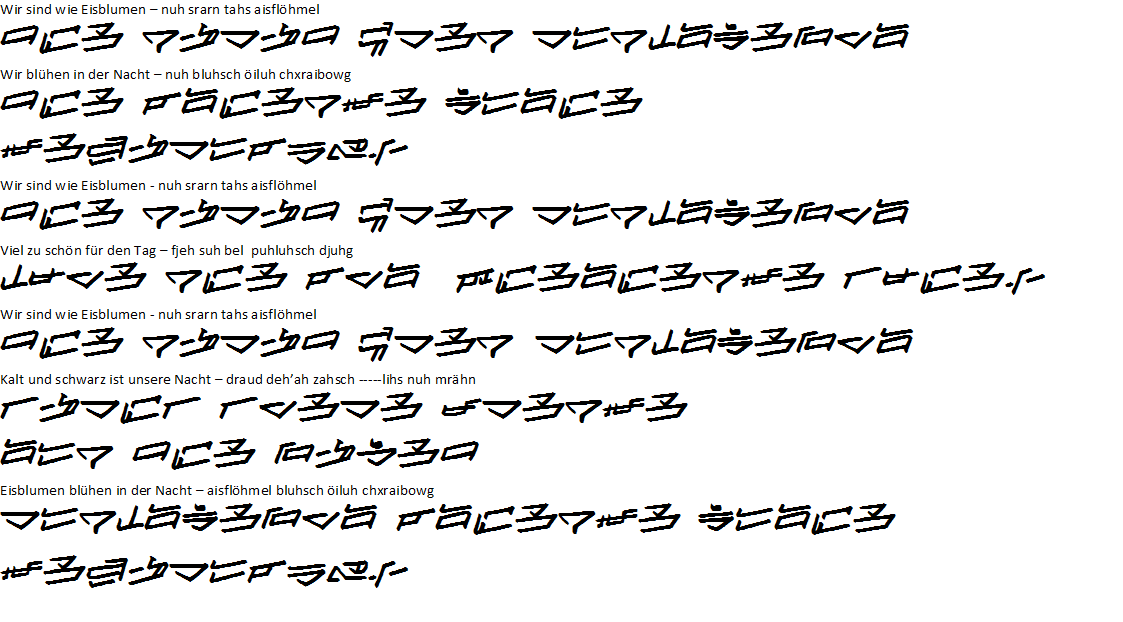
script
the script used for mrimaumri can be the mrimaumri hangeul, or the romanised script;
the romanised script "kimusch"/ "tharouvchstey" ciphers the romanised version of the syllables
the mrimaumric hangeul ciphers the syllables with one character per syllable
vowels in kimusch

consonants in kimusch

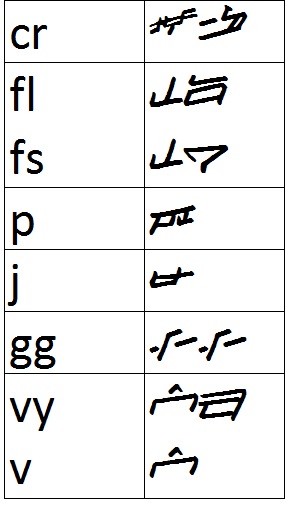
Other resources
alphabet
I made a syllable alphabet of 912 syllables. I used a conscript like hangeul to quickly have characters for all syllables. I wanted to know how much one and two syllable words can be constructed from the 912 syllables. That should be 912 one syllable words and 912*912 two syllable word. That should be a great variety of words.
I have an idea of how to establish the vocabulary. The time consuming thing is allocation. I lately heard about reverse sound from the vocabulary from other natlangs. I will not only reverse, reversing only gives the inspiration, then I put the first word drafts in my alphabet and grammatical system.
the green coloured syllables are rarely used
the blue ones and the violett ones are often used
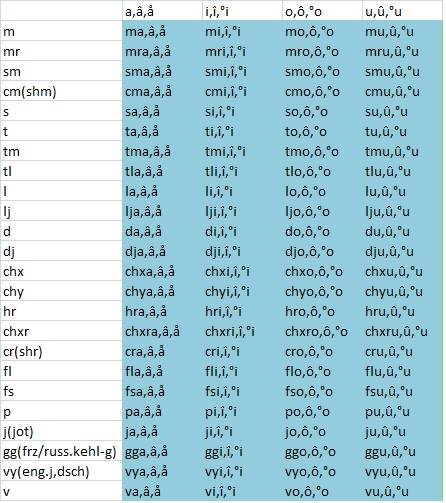
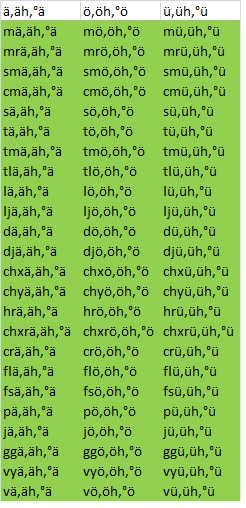
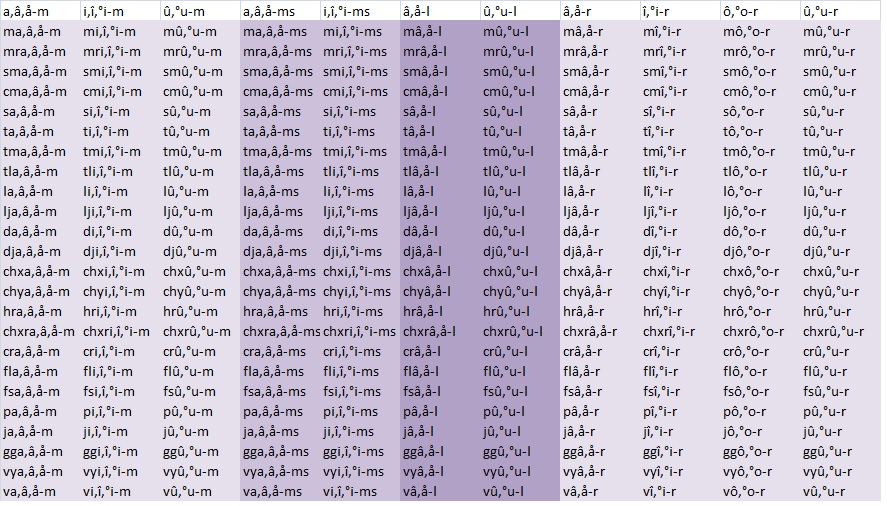
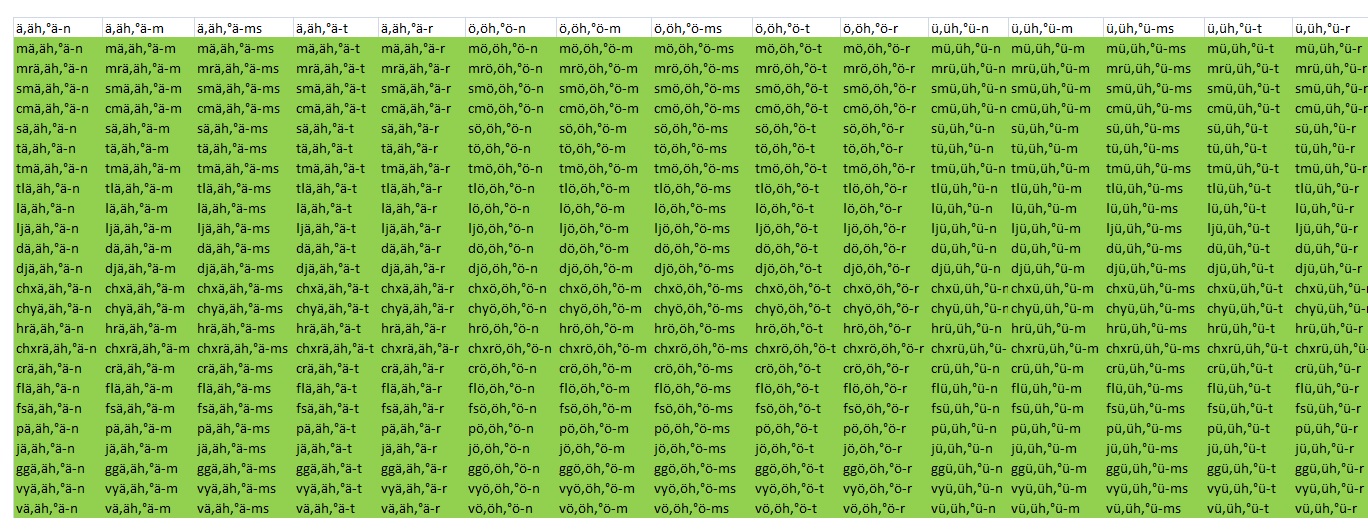
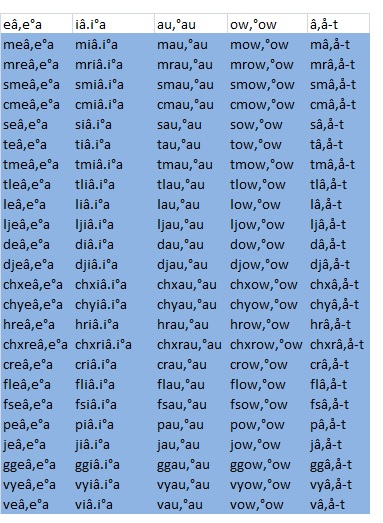

dictionary
pronouns
in subject in object akkusativ
Singular
ral - I - ich miâr - me - mich kôr - you - du däichy - you - dich rî - er - he lîn - him - ihn zîa - she - sie chyû, kîrl - her lörd - it - es
Plural
nû - we - wir kôr - you (all) - ihr täilm - they - sie frî - them - sie
in object dativ
me - mich kôr, dîr - dir
possesiv
mrî - my - mein
article
male article: ljû – the(male) - der, dieser, welcher;
female article: diâr – the(female) - die, diese, welche;
û - welcher, dieser (ersatz für der)
gû - welche, diese (ersatz für die)
nîs - of - von
mand - with pleasure - gerne
structure words
dîjû – and – und
ürndû - and - und
diofio - and the - und der/die/das
sû - to - zu
öils - in - in
ow - from - aus
lolû - from the - aus der/die/das/dem
êôn - in, at -in, an
pa - at - an
päi - at the - an der/die/das/dem
mî - on - auf
mäi - on the - auf der/die/das/dem
pûc - for - für
pûlûc - for the - für die/das/dem
tâs – like - wie
lûf – full - voll
baikêlêplê - please - bitte
some
manchy - some - einige
manchyvyîms - sometimes - manchmal
ggîmanchy, samcî - somebody - jemand
sandwân, manchyfsîn - something - etwas
gleich - same, to same, immediately, soon - gleich, bald
kaum - hardly, scarcely, shortly after (as soon as another action is finished)
gêgen - in the opposite, the opposite, against - im gegenteil, gegen
pro - per, the advantage - pro, Vorteil
just
tsui, tlârûgg - just - gerade
êben - just now - gerade
rûn, hrûow - just, only - nur
nach - after - nach
lînau - exactly, to be precise, right - genau
täsîn - exactly - exact
ow'örd - or - oder
kân - back, backside, the back - hinten, rückseite, Rücken
tîrkân - back to - zurück
tîr - syllable for to in german words
îmatmôr - common - ûblich
pre/suffix
tmôr - german adjective suffix -lich
wâl - german verb suffix -ern
ter - german prefix er-
ör - german suffix -er
tmî - german prefix be
noch - still - noch
ljûnîn - any - jeden
frô - glad - froh
sich - her/himself - sich
cm^ät^örling - butterfly - Schmetterling
verbs
sû svân, srarn, lis/slic – to be – sein
sû mraik, mrowg – to like – mögen
sû fên, pentalêm – to think – denken
sû aulbîr – to believe – glauben
sû klemê – to understand – verstehen
sû êdel – to help – helfen
sû rörn – to learn – lernen
sû chxörnrê – to teach – lehren, unterrichten
sû chyîd – to need – brauchen
sû taunechy – to use – (be)nutzen
sû îs – eat – essen
sû mîfî – drink - trinken
sû kapt – to catch – fangen
sû wîn – to flee - fliehen
sû lemôs – to give – geben
sû mênd – to take – nehmen
nouns
adjective to noun: add dêk
verb to nound: add gî
noun to verb: both have the same form
Plural: add "as" or "el", depends on the ending of the noun
objects
ljû mêsa/mêsas – the house/houses
diâr nûl/nûlel – the door/doors
diâr maumri/maumri’el – the language/languages
ljû djûg/djûgel - the day/days
diâr chxraibowg/chxraibowgel - the night/nights
nautik
diâr vyvûnchy/vyvûnchyel - the ship/ships - das Schiff/die Schiffe
ljû asârka/asârkas - the ocean/oceans - das Meer/ die Meere
ljû galôrpa/galôrpas - the gale/storm/storms - der Sturm/die Stürme
familiy
ljû dâl/dâlel, lald/laldel - the boy/boys
diâr calûa/calûas - the girl/girls, daughter/daughters
time
diâr chxoân/chxoânel - the time/times - die Zeit/Zeiten
diâr lôrûgg/lôrûggel - to clock/clocks - die Uhr/Uhren
ljû nîdnîdâo/nîdnîdâoel - the money/savings/funds - das Geld/die Gelder
diâr tv^äl/tv^älel - the world/worlds - die Welt/Welten
food
ljû plûma/plûmas - the meat - das Fleisch
ljû chxrâba/chxrâbas - the beverage/beverages - das Getränk/ die Getränke
ljû gurtâlmer/gurtâlmerel -the beer/beers - das Bier/ die Biere
ljû sai/saiel - the wine/wines - der Wein/die Weine
diâr smîlcô/smîlcô - the village/villages - das Dorf/die Dörfer
ljû smîlcôr/smîlcôr - the country/countries - das Land/die Länder
diâr gvîdî/gvîdîel - the town/towns - die Stadt/Städte
ljû glûrî/glûrîel - the shadow/shadows - der Schatten/die Schatten
=meteorologie
ljû draun/draunel - the sky/skies - der Himmel, die Himmel
diâr flowchx/flowchxel - the cloud/clouds - die Wolke/Wolken
ljû praupôr/praupôr - the steam/vapor/pl - der Dampf/die Dämpfe
ljû vîdjâl - the weather - das Wetter
ljû lûn - the moon - der Mond
diàr vimvy/vimvyel - the sun/suns
ljû vimvyelplôm / vimvyelfauârlowk - the sunrise - der Sonnenaufgang
ljû vimvyeltmarlowk - the sunset - der Sonnenuntergang
tmar - down
fauâr - up
fauârlowk - Aufgang
tmarlowk - Untergang
ljû lowk - der Gang
diâr tlown - dawn - die Dämmerung
diâr bjêm/bjêm - the light/lights - das Licht/die Lichter
diâr svîrs - the shine
ljû vimvysvîrs - the sunshine - der Sonnenschein
botanik
diâr mîadow/mîadowel - the meadow/meadows - die Wiese/Wiesen
diâr fl^öm/fl^ömel - the flower/flowers - die Blume/Blumen
ljû tabjûd - the face/countenance - das Antlitz
diâr tlôc/tlôcel - the face/the faces - das Gesicht/ die Gesichter
writing
ljû vûr/vûrel - the word/words - das Wort/die Wörter
ljû vaulîs/vaulîs - the sentence/sentences - der Satz/die Sätze
ljû m^üt/m^ütel - der text/ die texte
ljû bruchxa/bruchxa - the book/books - das Buch/die Bücher
diâr leâs/leâsas - the soap/soaps - die Seife/Seifen
diâr mrîcîl/mrîcîlel - the machine/the machines - die Maschine/die Maschinen